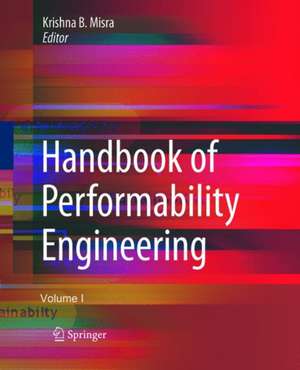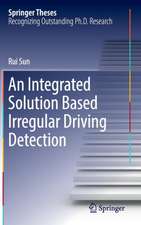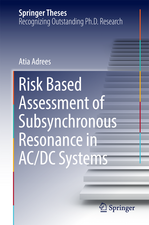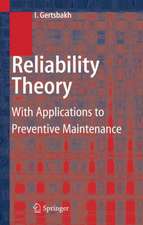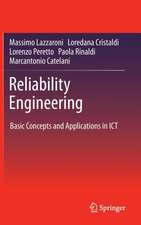Handbook of Performability Engineering
Editat de Krishna B. Misraen Limba Engleză Paperback – 2 apr 2019
| Toate formatele și edițiile | Preț | Express |
|---|---|---|
| Paperback (1) | 2655.91 lei 38-44 zile | |
| SPRINGER LONDON – 2 apr 2019 | 2655.91 lei 38-44 zile | |
| Hardback (1) | 2677.71 lei 38-44 zile | |
| SPRINGER LONDON – 27 aug 2008 | 2677.71 lei 38-44 zile |
Preț: 2655.91 lei
Preț vechi: 3494.62 lei
-24% Nou
Puncte Express: 3984
Preț estimativ în valută:
508.28€ • 528.68$ • 419.61£
508.28€ • 528.68$ • 419.61£
Carte tipărită la comandă
Livrare economică 10-16 aprilie
Preluare comenzi: 021 569.72.76
Specificații
ISBN-13: 9781447174080
ISBN-10: 1447174089
Pagini: 1316
Ilustrații: XCVI, 1316 p. In 2 volumes, not available separately.
Dimensiuni: 191 x 235 mm
Ediția:Softcover reprint of the original 1st ed. 2008
Editura: SPRINGER LONDON
Colecția Springer
Locul publicării:London, United Kingdom
ISBN-10: 1447174089
Pagini: 1316
Ilustrații: XCVI, 1316 p. In 2 volumes, not available separately.
Dimensiuni: 191 x 235 mm
Ediția:Softcover reprint of the original 1st ed. 2008
Editura: SPRINGER LONDON
Colecția Springer
Locul publicării:London, United Kingdom
Cuprins
Performability Engineering: An Essential Concept in the 21st Century.- Engineering Design: A Systems Approach.- A Practitioner’s View of Quality, Reliability and Safety.- Product Design Optimization.- Constructing a Product Design for the Environment Process.- Dependability Considerations in the Design of a System.- Designing Engineering Systems for Sustainability.- The Management of Engineering.- Engineering Versus Marketing: An Appraisal in a Global Economic Environment.- The Performance Economy: Business Models for the Functional Service Economy.- Cleaner Production and Industrial Ecology: A Dire Need for 21st Century Manufacturing.- Quality Engineering and Management.- Quality Engineering: Control, Design and Optimization.- Statistical Process Control.- Engineering Process Control: A Review.- Six Sigma — Status and Trends.- Computer Based Robust Engineering.- Integrating a Continual Improvement Process with the Product Development Program.- Reliability Engineering: A Perspective.-Tampered Failure Rate Load-Sharing Systems: Status and Perspectives.- O(kn) Algorithms for Analyzing Repairable and Non-repairable k-out-of-n:G Systems.- Imperfect Coverage Models: Status and Trends.- Reliability of Phased-mission Systems.- Reliability of Semi-Markov Systems in Discrete Time: Modeling and Estimation.- Binary Decision Diagrams for Reliability Studies.- Field Data Analysis for Repairable Systems: Status and Industry Trends.- Reliability Degradation of Mechanical Components and Systems.- New Models and Measures for Reliability of Multi-state Systems.- A Universal Generating Function in the Analysis of Multi-state Systems.- New Approaches for Reliability Design in Multistate Systems.- New Approaches to System Analysis and Design: A Review.- Optimal Reliability Design of a System.- MIP: A Versatile Tool for Reliability Design of a System.- Reliability Demonstration in Product Validation Testing.- Quantitative Accelerated Life-testing and Data Analysis.- HALT and HASS Overview: The New Quality and Reliability Paradigm.- Modeling Count Data in Risk Analysis and Reliability Engineering.- Fault Tree Analysis.- Common Cause Failure Modeling: Status and Trends.- A Methodology for Promoting Reliable Human-System Interaction.- Risk Analysis and Management: An Introduction.- Accident Analysis of Complex Systems Based on System Control for Safety.- Probabilistic Risk Assessment.- Risk Management.- Risk Governance: An Application of Analytic-deliberative Policy Making.- Maintenance Engineering and Maintainability: An Introduction.- System Maintenance: Trends in Management and Technology.- Maintenance Models and Optimization.- Replacement and Preventive Maintenance Models.- Effective Fault Detection and CBM Based on Oil Data Modeling and DPCA.- Sustainability: Motivation and Pathways for Implementation.- Corporate Sustainability: Some Challenges for Implementing and Teaching Organizational Risk Management in a Performability Context.- Towards Sustainable OperationsManagement Integrating Sustainability Management into Operations Management Strategies and Practices.- Indicators for Assessing Sustainability Performance.- Sustainable Technology.- Biotechnology: Molecular Design in a Globalizing World.- Nanotechnology: A New Technological Revolution in the 21st Century.- An Overview of Reliability and Failure Mode Analysis of Microelectromechanical Systems (MEMS).- Amorphous Hydrogenated Carbon Nanofilm.- Applications of Performability Engineering Concepts.- Reliability in the Medical Device Industry.- A Tasks-based Six Sigma Roadmap for Healthcare Services.- Status and Recent Trends in Reliability for Civil Engineering Problems.- Performability Issues in Wireless Communication Networks.- Performability Modeling and Analysis of Grid Computing.- Status and Trends in the Performance Assessment of Fault Tolerant Systems.- Prognostics and Health Monitoring of Electronics.- RAMS Management of Railway Tracks.- Cost-Benefit Optimization Including Maintenance for Structures by a Renewal Model.- Reliability and Price Assessment and the Associated Risk Control for Restructured Power Systems.- Probabilistic Risk Assessment for Nuclear Power Plants.- Software Reliability and Fault-tolerant Systems: An Overview and Perspectives.- Application of the Lognormal Distribution to Software Reliability Engineering.- Early-stage Software Product Quality Prediction Based on Process Measurement Data.- On the Development of Discrete Software Reliability Growth Models.- Epilogue.
Recenzii
From the reviews:
The 100 international contributors to this book's 76 chapters provide depth and considerable diversity to the subject... Each chapter can be read independently and includes careful definitions and reviews of major topics and good descriptions of main methods... The editor's philosophy is to provide all engineers "with a wider vision of the requirement of sustainable and dependable products, systems, and services in the 21st century." This book provides a guide and reference for many of the engineering tools needed to accomplish this... Recommended.
Choice (August 2009) (Reviewer: S. A. Batterman, University of Michigan)
"The reader has a veritable garden from which to feast from this impressive collection of chapters."
Dr William Vesely,
Manager, Risk Assessment, Office of Safety and Mission Assurance, NASA
"Clearly covers the entire canvas of performability: quality, reliability, maintainability, safety and sustainability."
Way Kuo,
Editor-in-Chief, IEEE Transactions on Reliability
President, City University of Hong Kong
Formally Dean of Engineering and University Distinguished Professor, University of Tennessee
"The book should be of interest for reliability researchers or instructors that need some additional material--such as examples or new trends--for intensive courses given in reliability engineering. … the technical content is impressive and the vast diversity of areas covered can be perceived as its greatest advantage; it enables, for instance, networking reliability experts to get acquainted with the mechanics of software reliability, which can be quite inspiring." (Piotr Cholda, ACM Computing Reviews, March, 2009)
The 100 international contributors to this book's 76 chapters provide depth and considerable diversity to the subject... Each chapter can be read independently and includes careful definitions and reviews of major topics and good descriptions of main methods... The editor's philosophy is to provide all engineers "with a wider vision of the requirement of sustainable and dependable products, systems, and services in the 21st century." This book provides a guide and reference for many of the engineering tools needed to accomplish this... Recommended.
Choice (August 2009) (Reviewer: S. A. Batterman, University of Michigan)
"The reader has a veritable garden from which to feast from this impressive collection of chapters."
Dr William Vesely,
Manager, Risk Assessment, Office of Safety and Mission Assurance, NASA
"Clearly covers the entire canvas of performability: quality, reliability, maintainability, safety and sustainability."
Way Kuo,
Editor-in-Chief, IEEE Transactions on Reliability
President, City University of Hong Kong
Formally Dean of Engineering and University Distinguished Professor, University of Tennessee
"The book should be of interest for reliability researchers or instructors that need some additional material--such as examples or new trends--for intensive courses given in reliability engineering. … the technical content is impressive and the vast diversity of areas covered can be perceived as its greatest advantage; it enables, for instance, networking reliability experts to get acquainted with the mechanics of software reliability, which can be quite inspiring." (Piotr Cholda, ACM Computing Reviews, March, 2009)
Notă biografică
Professor Krishna B. Misra is principal consultant at RAMS Consultants. He has worked for the Indian Institute of Technology, Roorkee; the Indian Institute of Technology, Kharagpur, which he also founded; and the Reliability Engineering Centre.
In previous years Professor Misra has also been appointed Director-Grade-Scientist at the National Environmental Engineering Research Institute and Director of the North Eastern Regional Institute of Science and Technology.
In previous years Professor Misra has also been appointed Director-Grade-Scientist at the National Environmental Engineering Research Institute and Director of the North Eastern Regional Institute of Science and Technology.
Textul de pe ultima copertă
Performability engineering provides us with the framework to consider both dependability and sustainability for the optimal design of products, systems or services. Whereas dependability is an aggregate of one or more of the attributes of survivability (such as quality, reliability, and maintainability etc.) and safety, and the present designs based on dependability and life cycle costs cannot be really called truly optimal since these attributes are strongly influenced by the design, raw materials, fabrication, techniques and manufacturing processes employed, and their control and usage. Therefore, sustainability, characterized by dematerilization, energy and waste minimization, disposability, reuse and recycling and other the environmental considerations which help in clean production, must be considered along with dependability. Design of 21st Century products, systems and services must conform to performability designs. More so when world resources are on the declineand to keep pace with rising population, the increased volume of production is bound to affect the world’s environmental health further.
As of now, dependability and cost effectiveness are primarily seen as instruments for conducting the international trade in the free market environment and thereby deciding the economic prosperity of a nation. However, the internalization of the hidden costs of environment preservation will have to be accounted for, sooner or later, in order to be able to produce sustainable products and systems in the long run. These factors cannot be ignored any more and must not be considered in isolation of each other.
The Handbook of Performability Engineering considers all aspects of performability engineering, providing a holistic view of the entire life cycle of activities of the product, along with the associated cost of environmental preservation at each stage, while maximizing the performance.
As of now, dependability and cost effectiveness are primarily seen as instruments for conducting the international trade in the free market environment and thereby deciding the economic prosperity of a nation. However, the internalization of the hidden costs of environment preservation will have to be accounted for, sooner or later, in order to be able to produce sustainable products and systems in the long run. These factors cannot be ignored any more and must not be considered in isolation of each other.
The Handbook of Performability Engineering considers all aspects of performability engineering, providing a holistic view of the entire life cycle of activities of the product, along with the associated cost of environmental preservation at each stage, while maximizing the performance.
Caracteristici
Considers all aspects of performability engineering, providing a holistic view of the entire life cycle of the product, including the associated cost of environmental preservation, while maximizing performance Includes supplementary material: sn.pub/extras
